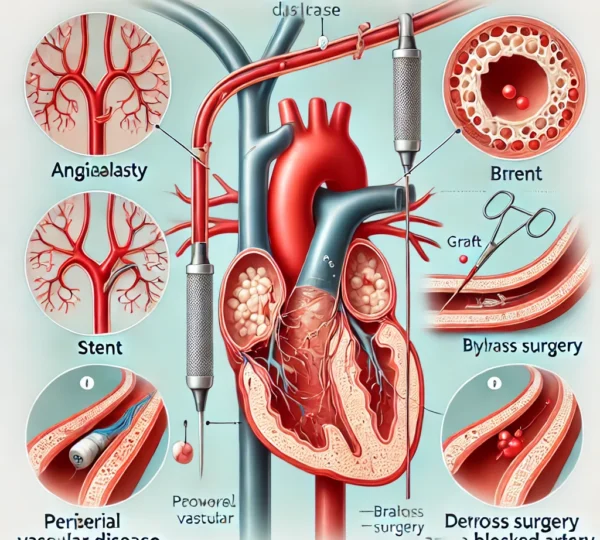Surgical Interventions for Peripheral Vascular Disease: What to Expect+
Introduction
When lifestyle changes and medications aren’t enough to manage Peripheral Vascular Disease (PVD), surgical interventions may be necessary. These procedures help improve blood flow and alleviate symptoms. Let’s take a closer look at the types of surgeries used to treat PVD and what you can expect from each procedure.
1. Angioplasty and Stenting
Angioplasty is a procedure where doctors insert a small balloon into the blocked artery and inflate it to widen the narrowed area. In some cases, doctors place a stent, a tiny mesh tube, to keep the artery open and prevent it from narrowing again.
2. Bypass Surgery
Bypass surgery creates a detour around the blocked or narrowed artery by using a graft. This graft can be a healthy blood vessel from another part of your body or a synthetic tube. The surgery restores blood flow, improving circulation to affected areas, particularly the legs.
What to Expect
- Before Surgery: Your doctor will explain the procedure and address any questions you may have. You will receive instructions on fasting and medications to take before surgery.
- During Surgery: You will be under anesthesia, so you won’t feel any pain during the procedure.
- Recovery: Recovery time varies based on the type of surgery and your overall health. You may stay in the hospital for a few days to a week.
- Post-Surgery Care: After the procedure, your healthcare team will closely monitor you for any complications, such as infection or blood clots.
- Rehabilitation: Physical therapy may be recommended to help you regain strength and mobility.
Conclusion
Surgical interventions, like angioplasty, stenting, and bypass surgery, can help restore proper blood flow and relieve symptoms of Peripheral Vascular Disease. These procedures can reduce the risk of complications, such as leg pain and limited mobility. Work with your healthcare team to determine the best treatment plan for your needs and improve your overall well-being.
To seek medical advice, always consult a Doctor.
Here are our recommended experts. Click here
To read more on Heart Disease . Click Here



